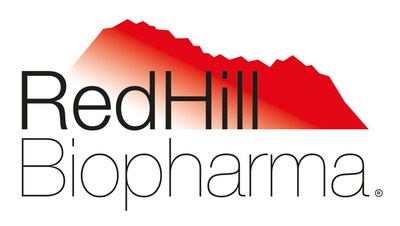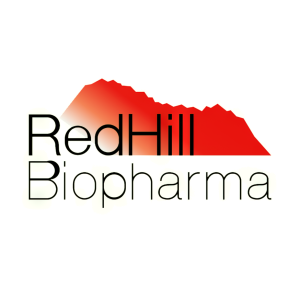RedHill Biopharma Secures Allowance of Key Chinese Patent Application for Proprietary COVID-19 Treatment, RHB-107
Rhea-AI Summary
RedHill Biopharma (RDHL) has secured a key Chinese patent for RHB-107, its COVID-19 treatment candidate. The patent, granted by China National Intellectual Property Administration, covers the compound's molecular structure and its use in treating SARS-CoV-2 infections, including variants.
The company's Phase 2 study demonstrated promising results with 100% reduction in COVID-19 hospitalization (0/41 patients on RHB-107 vs 3/20 on placebo) and approximately 88% reduction in new severe COVID-19 symptoms (2.4% RHB-107 vs 20% placebo). Recovery time was notably faster at 3 days with RHB-107 compared to 8 days with placebo.
RHB-107 is an oral, once-daily, host-directed antiviral designed to act independently of viral spike protein mutations. The patent strengthens RedHill's position in the global COVID-19 therapeutic market, projected to be worth over $3 billion in 2025.
Positive
- 100% reduction in COVID-19 hospitalization in Phase 2 trial
- 88% reduction in severe COVID-19 symptoms
- Faster recovery time (3 days vs 8 days with placebo)
- Secured strategic Chinese patent protection
- Non-dilutive funding support from U.S. Department of Defense
Negative
- Phase 2 study had relatively small sample size (61 total patients)
- Product still in development phase, not yet approved
- Faces competition from established treatments like Pfizer's Paxlovid
News Market Reaction
On the day this news was published, RDHL declined 9.96%, reflecting a notable negative market reaction.
Data tracked by StockTitan Argus on the day of publication.
Strong Use of Composition-of-Matter Coverage: Patent protects the molecular structure of RHB-107, providing market exclusivity beyond method-of-use claims
COVID-19 Therapeutic Use: Includes coverage for treatment of SARS-CoV-2, including wild-type and emerging variants
This patent grant enhances RedHill's strategic positioning in the global COVID-19 therapeutic space, a market still expected to be worth more than
RHB-107 successfully met the primary endpoint of safety and tolerability, delivering promising reduction in hospitalization efficacy results in a
RHB-107 is a novel, patient-friendly oral, once-daily, host-directed potential broad-acting antiviral expected to act independently of viral spike protein mutations[3]

"This newly allowed Chinese patent application is a significant success, enhancing RedHill's strategic positioning in the global COVID-19 therapeutic space – a market still expected to be worth more than
Data from RHB-107's
About RHB-107 (upamostat)
RHB-107 is a proprietary, first-in-class, once-daily orally administered investigational antiviral, that targets human serine proteases involved in preparing the spike protein for viral entry into target cells. Because it is host-cell targeted, RHB-107 is expected to also be effective against emerging viral variants with mutations in the spike protein. RHB-107 is well tolerated; in the initial COVID-19 study, among 41 patients only one reported a drug-related adverse reaction (a mild, self-limited, rash).
In addition, RHB-107 inhibits several proteases targeting cancer and inflammatory gastrointestinal disease. RHB-107 has undergone several Phase 1 studies and two Phase 2 studies, demonstrating its clinical safety profile in approximately 200 patients[4].
RedHill acquired the exclusive worldwide rights to RHB-107, excluding
About RedHill Biopharma
RedHill Biopharma Ltd. (Nasdaq: RDHL) is a specialty biopharmaceutical company primarily focused on U.S. development and commercialization of drugs for gastrointestinal diseases, infectious diseases and oncology. RedHill promotes the FDA-approved gastrointestinal drug Talicia, for the treatment of Helicobacter pylori (H. pylori) infection in adults[5], with submission planned for marketing authorization in other territories. RedHill's key clinical late-stage development programs include: (i) opaganib (ABC294640), a first-in-class, orally administered sphingosine kinase-2 (SPHK2) selective inhibitor with anticancer, anti-inflammatory and antiviral activity, targeting multiple indications with U.S. Government and academic collaborations for development for radiation and chemical exposure indications such as Gastrointestinal-Acute Radiation Syndrome (GI-ARS), a Phase 2 study in prostate cancer in combination with Bayer's darolutamide and a Phase 2/3 program for hospitalized COVID-19 patients; (ii) RHB-204, an all-in-one, fixed-dose, orally administered, combination antibiotic therapy with a planned Phase 2 study for Crohn's disease and Phase 3-stage for pulmonary nontuberculous mycobacterial (NTM) disease; (iii) RHB-104, with positive results from a first Phase 3 study for Crohn's disease; (iv) RHB-107 (upamostat), an oral broad-acting, host-directed, serine protease inhibitor with potential for pandemic preparedness, is in late-stage development as a treatment for non-hospitalized symptomatic COVID-19 and is also targeting multiple other cancer and inflammatory gastrointestinal diseases; and (v) RHB-102, with potential
More information about the Company is available at: www.redhillbio.com / twitter.com/RedHillBio.
Forward Looking Statement
This press release contains "forward-looking statements" within the meaning of the Private Securities Litigation Reform Act of 1995 and may discuss investment opportunities, stock analysis, financial performance, investor relations, and market trends. Such statements may be preceded by the words "intends," "may," "will," "plans," "expects," "anticipates," "projects," "predicts," "estimates," "aims," "believes," "hopes," "potential" or similar words. Forward-looking statements are based on certain assumptions and are subject to various known and unknown risks and uncertainties, many of which are beyond the Company's control and cannot be predicted or quantified, and consequently, actual results may differ materially from those expressed or implied by such forward-looking statements. Such risks and uncertainties include, without limitation: market and other conditions; the Company's ability to regain and maintain compliance with the Nasdaq Capital Market's listing requirements; the risk that the addition of new revenue generating products or out-licensing transactions will not occur; the risk of current uncertainty regarding
Category: R&D
[1] https://www.cognitivemarketresearch.com/covid-19-therapeutics-market-report
[2] A randomized, placebo-controlled pilot study of upamostat, a host-directed serine protease inhibitor, for outpatient treatment of COVID-19 Plasse, Terry F et al. International Journal of Infectious Diseases, Volume 128, 148 – 156.
[3] Preliminary data from a recent in vitro study.
[4] https://www.ijidonline.com/article/S1201-9712(22)00638-5/fulltext.
[5] Talicia® (omeprazole magnesium, amoxicillin and rifabutin) is indicated for the treatment of H. pylori infection in adults. For full prescribing information see: www.Talicia.com.
Company contact:
Adi Frish
Chief Corporate & Business Development Officer
RedHill Biopharma
+972-54-6543-112
adi@redhillbio.com
Logo: https://mma.prnewswire.com/media/1334141/RedHill_Biopharma_Logo.jpg
![]() View original content:https://www.prnewswire.com/news-releases/redhill-biopharma-secures-allowance-of-key-chinese-patent-application-for-proprietary-covid-19-treatment-rhb-107-302439596.html
View original content:https://www.prnewswire.com/news-releases/redhill-biopharma-secures-allowance-of-key-chinese-patent-application-for-proprietary-covid-19-treatment-rhb-107-302439596.html
SOURCE RedHill Biopharma Ltd.







